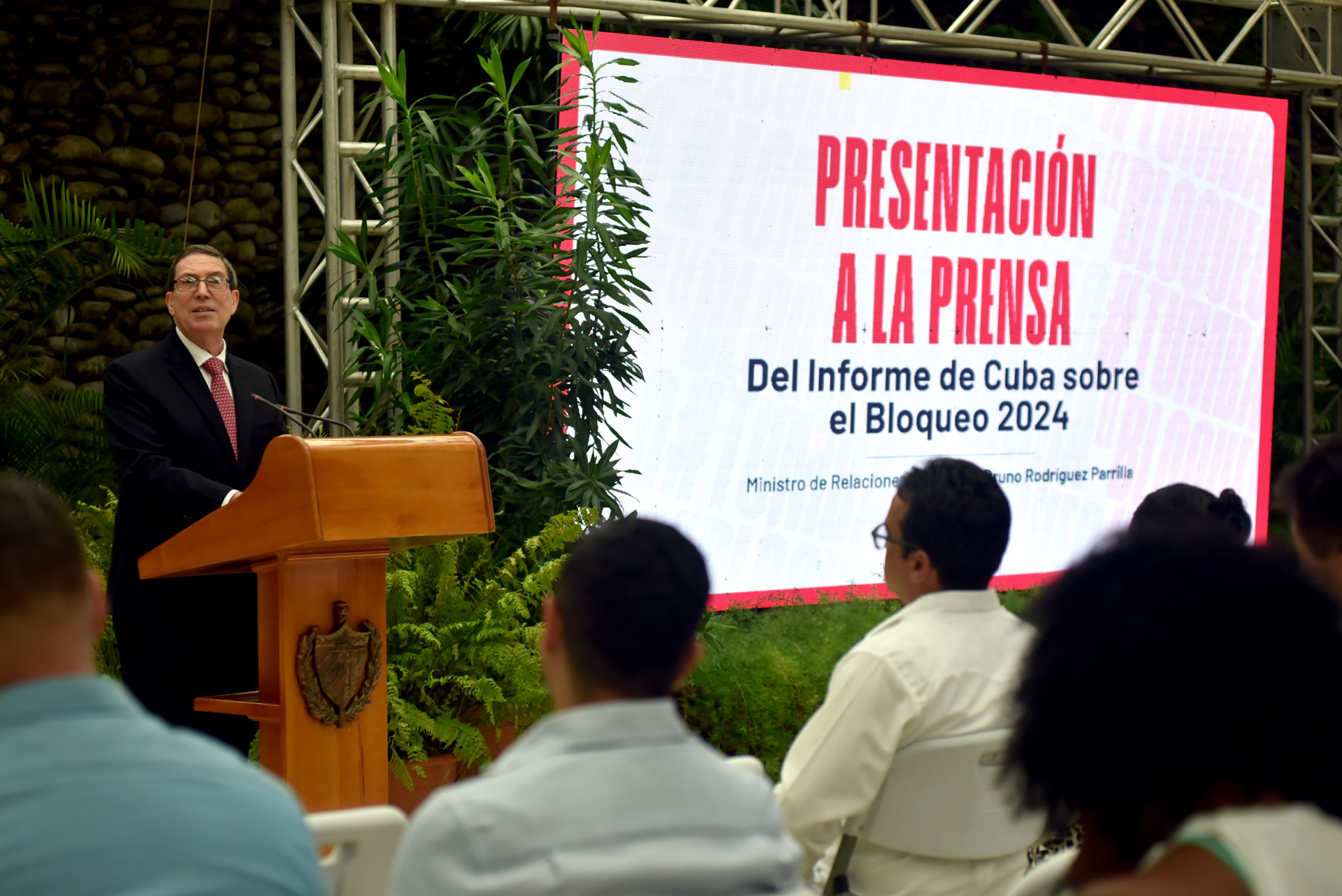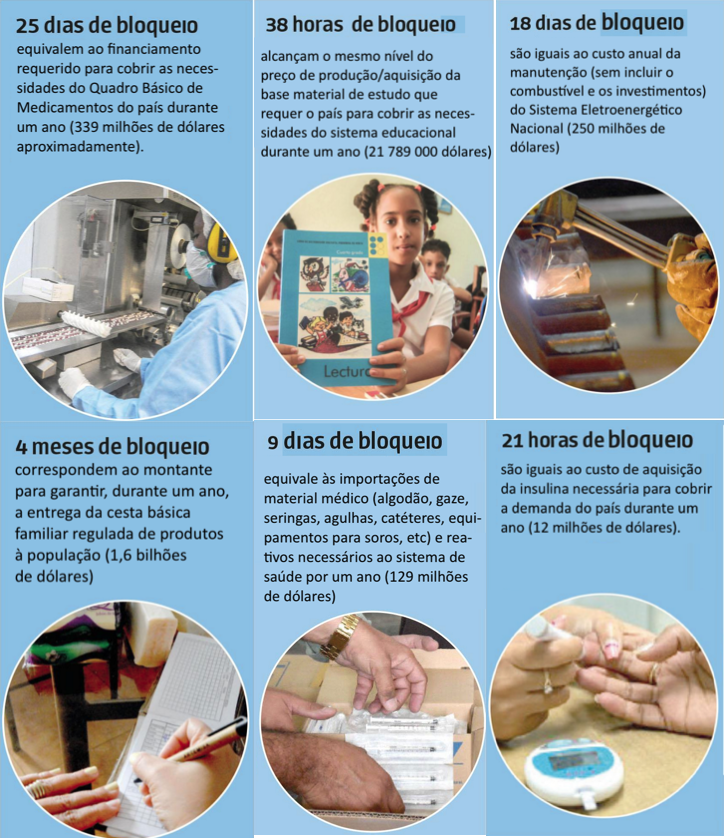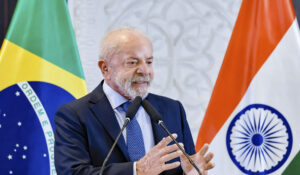
Posted 09/14/2024 10:30 | Edited 09/14/2024 12:13
The Cuban government reiterated this Thursday, the 12th, its complaint against the United States for implementing a blockade against Cuba for more than six decades. “At current prices, the accumulated damages of the blockade over these six decades amount to the astronomical figure of US$164.14 billion,” highlighted the Cuban Minister of Foreign Affairs, Bruno Rodríguez.
Taking into account the current devaluation of the dollar against gold, this damage figure would rise to more than US$1.499 trillion. If this hostile policy of the United States did not exist, Cuba’s Gross Domestic Product (GDP, an indicator of a country’s economy) in 2023 could have grown by around 8%.
Cuba’s GDP totaled US$107.3 million in 2020. This means that the US blockade has caused losses equivalent to almost 15 times the island’s GDP. The complaint is contained in the report “Necessity of ending the economic, commercial and financial blockade imposed by the United States of America against Cuba”, presented by the Cuban foreign minister. The text responds to a draft resolution that is expected to be discussed at the end of next month by the United Nations General Assembly.
These figures are directly reflected in people’s daily lives. The story of Marilín Peña Pérez, a popular educator and sociologist at the Martin Luther King Memorial Center, reflects the multiple consequences of the economic blockade imposed by the United States on Cuba. Suffering from acute myopia since the age of eight, Marilín underwent several surgeries that left her dependent on advanced treatments and medications that the country cannot obtain due to sanctions that restrict access to cutting-edge technologies of North American origin.
This is just one of the countless stories that permeate daily life in Cuba, as reported by Daniela Cabrera Monzonin the newspaper Granmathe official organ of the Communist Party of Cuba. The ban on purchasing medical equipment, the high costs of supplies in distant markets and the direct impact on public health are palpable effects of a blockade that has lasted more than six decades.

International condemnation
The economic embargo imposed by the United States against Cuba is one of the most condemned international measures annually at the United Nations General Assembly (UN). Since 1992, the organization has approved resolutions demanding the end of the measure, which, over the years, has received almost unanimous support from its 193 members. In 2016, the resolution received 191 votes in favor and none against, with the United States itself abstaining.
The reasons for condemning the embargo are varied and, in many cases, do not necessarily represent support for the Cuban regime, but rather a criticism of the extraterritorial nature of the sanctions. Many European countries, for example, express their opposition to the fact that the embargo restricts the freedom of foreign companies to do business with Cuba, in addition to considering the measure a dangerous precedent for unilateral and coercive actions.
The embargo: a decades-long legal web
The U.S. embargo is the result of a complex web of laws and regulations developed over decades. Its roots date back to 1960, when then-President Dwight Eisenhower imposed the first sanctions in response to the nationalization of U.S. property in Cuba. These actions culminated in a full trade embargo in 1962, instituted by President John F. Kennedy.
Since then, several laws, such as the Torricelli Act (1992) and the Helms-Burton Act (1996), have expanded the scope of the embargo, even affecting foreign companies wishing to do business with Cuba. These laws impose severe restrictions on trade between Cuba and other nations, increasing the island’s economic isolation.
Flexibility and hardening
Although the embargo remained in place for decades, it has been relaxed somewhat. In 2000, the export of food, agricultural products and medicines was partially permitted. During the Barack Obama administration, there was an effort to normalize relations between the two countries, resulting in a relaxation of travel and remittances to Cuba.
However, the Trump administration has reversed those policies, taking a tougher line, including reinstating a section of the Helms-Burton Act that allows Americans to sue foreign companies that use property confiscated by the Cuban government.
The real impacts of the embargo
The Cuban government attributes much of the economic problems faced by the population to the embargo, citing, for example, the difficulties in obtaining international investment and financing. Rodríguez detailed the impact of the blockade on sectors such as public health, education, transportation and construction, among other public services in high demand among the Cuban population. “What makes the Cuban economy unique (…) is the oppressive and suffocating presence of the blockade,” he said.
The minister describes Washington’s policy towards the island as an economic war “in technical terms typified in international instruments” and said this means the country now has “a war economy”.
However, critics of the Cuban government argue that the island maintains trade relations with several countries around the world (particularly other countries sanctioned by the US) and that it receives investment in sectors such as tourism. The minister does not deny this argument. Not all of the difficulties facing Cuban society are the result of the blockade alone – the Minister of Foreign Affairs acknowledged – “but it would be untrue not to identify it as the main obstacle to our development.”
Rodríguez Parrilla explained that the blockade is affecting crucial sectors, from the availability of food and medicine to the import of essential public health equipment, such as ventilators during the COVID-19 pandemic. Cuba has been forced to seek alternatives in distant markets, which makes obtaining basic necessities even more expensive.
In 2024, the deficit of school uniforms reached almost half a million pieces, reflecting the shortage of raw materials and high production costs. In addition, airline operations and tourism also faced significant declines, with the cancellation of flights by major operators due to low demand and business difficulties imposed by the lockdown.
The minister also detailed in particular the damage caused to the Caribbean country by its inclusion on the List of State Sponsors of Terrorism, unilaterally drawn up by the State Department and which severely affects Havana’s international economic relations. The accusation makes no sense at all, considering that Cuba is in no position to “sponsor” its own economic base.
The US embargo on Cuba is a policy that, in addition to severely impacting the island’s economy, is widely criticized internationally. The sanctions have a profound effect on the daily lives of Cubans. Commercial isolation has created a difficult situation, where the prospects for change remain uncertain as long as the sanctions remain in place.
With information from the Granma newspaper, the official organ of the Communist Party of Cuba
Source: vermelho.org.br

